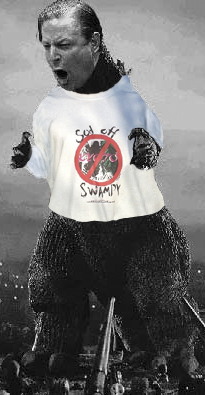Playing Russian Roulette

Viktor Yushchenko, Ukrainian president, on Wednesday condemned the decision by parliament to oust his government over last week’s gas deal with Russia but reassured European gas consumers that there would be no disruption to supplies.
…Ukraine was plunged into fresh political turmoil on Tuesday as its parliament sacked the pro-western government of Yuri Yekhanurov after he was accused of striking a poor deal to end the gas price dispute with Russia
…The vote was a heavy blow to the presidency of Mr Yushchenko, who now faces the prospect of working with a hostile government after parliamentary elections in March. Ukraine’s new constitution, which came into force on January 1, has stripped the president of the power to appoint the cabinet.
Supporters of Volodymyr Lytvyn, the centrist speaker of parliament, joined pro-Russian opponents of Mr Yushchenko and supporters of former prime minister Yulia Tymoshenko in the vote to sack Mr Yekhanurov
…Hryhory Nemyria, an adviser to Ms Tymoshenko, said Mr Yekhanurov and his cabinet would probably stay on as the acting government for 60 days, which is the maximum allowed after dismissal.
A caretaker government would then serve until a new government was formed by the newly elected parliament.
Tuesday’s vote raises the possibility that the pro-Russian opposition, which held power until the Orange Revolution in 2004, could attempt to regain power before the March elections by using powers granted to parliament under a revised constitution.
I guess the present Parliment has forgotten why they were all standing in the square to begin with. Don’t believe for one minute this is all about gas prices, although it does reek…but of paybacks. A name mentioned above bears a good deal of scrutiny ~ former prime minister Yulia Tymoshenko. Oddly enough, there was quite a lengthy article on her in the NYT Magazine** New Year’s weekend. The Ukrainian constitution and pipeline crisis seemed to have played right into her hand: with none of her fingerprints anywhere to be found, but evidence of them everywhere.
One Thursday morning this past September,Yulia Tymoshenko, Ukraine’s prime minister, came to work to discover she had been fired. It is rare that events conspire to nudge Tymoshenko off balance. In a photograph taken that morning, the heroine of Ukraine’s Orange Revolution and, as prime minister, her country’s second most powerful official, looks stricken, gaping at a television screen on which her former ally, President Viktor Yushchenko, announces his decision to dissolve a bickering and ineffective government. By the next day, Tymoshenko would be swinging a hatchet in the sort of political brawl at which she excels. But for the moment, the peasant-braided field marshal of mass protests in this ex-Soviet republic resembled that archetypal creature: a handsome woman wronged.

The Prime Minister who replaced her wasn’t exactly well received…
At the rally in November, Yushchenko’s new prime minister, Yuriy Yekhanurov, was greeted with shouts of ”shame, shame” when he took the stage. Shame, one of the shouting men explained, because he had had the temerity to replace Yulia. It may or may not be shameful, but it is a fact in Ukraine that there exists frustration with the Yushchenko team’s abdication of the idea that the revolution was significantly meant to exact justice from a criminal elite.
…and he’s now out of a job. Convenient, that. Shelob ring a bell?
All of this is significant because this poor, sprawling nation of 47 million people now matters in a way it has not since the Soviet Union’s collapse. Bordered by the European Union on the West and by a newly fractious Russia to the north and east, Ukraine is today, as it has been in the past, a buffer space over which empires eye each other warily.
”In Ukraine the stakes are incredibly high,” says Oksana Antonenko, a senior fellow on Russia and Eurasia at London’s International Institute for Strategic Studies. New E.U. member states like Poland and Hungary that have traumatic cultural memories of Russian dominance, Antonenko says, see Ukraine as ”a symbolic issue, for stopping Russia’s post-Soviet neoimperialism.” This is a neoimperialism that worries Ukraine — a place that even today many Russians have a hard time imagining as something other than the southern portion of their own country. Europe, for its part, has everything to gain from stability on its borders. **
We could do without this kinda stuff right now. I think it’s called ‘piling on’.
UPDATE: A profile piece on her from The Age.com.au.
**Riveting reading, but it’s a Times Select piece, damn their eyes.

Hmmm…
Silly me. I’m less concerned about Ms. Tymoshenko’s absent prints than Mr. Putin’s quite evident ones. Damn straight he engineered this crisis to damage the pro-Western Ukrainians. Wonder if/how he got to Tymoshenko?
She’s adept at doing what comes naturally.